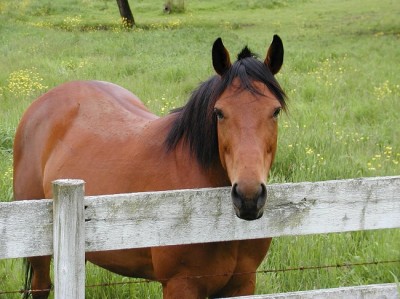One animal synonymous with homestead life is the horse.
Humans, particularly women it seems, are naturally drawn to these beautiful equines. Many people interested in homesteading grew up watching old Westerns and idolized that way of life. Horses certainly have a place on the homestead, but they are one type of livestock in which you need to study the pros and cons before purchase.
The Truth about Horses
In a nutshell, horses can quite easily hurt a person, completely on accident. When dealing with a 1,200-pound animal with a mind of its own – with varying emotions that differ from day to day — you can and will get hurt if you don’t know what you are doing. Heck, even those who’ve spent years around horses still get hurt.
The biggest difference between keeping horses and other large livestock like cattle is the fact that most people will want to, of course, ride their horse. Riding horses in a manner that is safe for you and comfortable for the horse takes skill, and this skill can’t be achieved at home by trying to teach yourself. It’s safe to say that you will need to take riding lessons as well as have an experienced horseman mentor you for at least a year. Even if you once rode horses as a child and are now an adult looking to re-enter horse keeping, it’s still a good idea to take some lessons as a refresher.
Everything You Need To Know To Become A Self-Sufficient Homeowner
Another aspect about horse keeping many people don’t take seriously: just how much money it costs to keep a pair of horses.
The Cost of Horse Keeping
A horse, or two horses as they shouldn’t be alone, likely will be the most expensive livestock or pet you could keep. Horses are absolute money-munchers, especially if you are just keeping them for pleasure. It can easily cost close to $2,000 a year or more to care for a single horse. This doesn’t include the original purchase price or an emergency vet visit.
Some things to consider are:
- Feed (good quality hay and possibly grain, salt/mineral block, supplements)
- General supplies (water trough, pitchfork, bedding, wheelbarrow, etc.)
- Farrier services (even if your horse is barefoot he will need trims)
- Vet care (floating teeth, general check-up, vaccinations, pre-purchase exam)
- De-wormer
- Tack (proper saddle and bridle, halters, lead ropes, saddle pads, etc.)
- Housing (boarding, fencing, shelter of some sort like a stable or 3-sided run-in)
Most of all, horses can eat up your TIME. They are inquisitive, intelligent animals that you should interact with. If you don’t plan on spending time with them, then perhaps you should not get them in the first place.
The original purchase price of a good, well-broken horse in its prime might be anywhere from $1,000 to $5,000 or more depending on what you are looking for.
Another tip about the price of a good horse is to treat it like buying a car. You might save money with the old beat-up car but you certainly will pay for it in the long run. This applies to horses.
It bears mentioning that unless you plan on boarding your horses, then the toll horses have on your property needs to be considered. Keeping horses on your own property is definitely rewarding (this is my ideal choice and how I kept my mares) but comes with potential roadblocks. First off is fencing.
Want The Best Chemical-Free, All-Natural Insecticide — For Your Garden AND Home?
Barbed wire and that sharp smooth wire fencing is NOT horse safe. Maybe you’ll get by with it for a few years, but horses have an incredible talent for getting themselves hurt (another reason to set aside funds for emergency vet bills). They will eventually get themselves injured on the fence, unless perhaps they are kept on very large acreage. Shelter is important, but most healthy adult horses have no problem using a simple old three-sided shelter to get out of the elements.
One more thing to consider with the price: how horses treat pasture land. Horses love to eat the best bits of the pasture and leave the rest. Their hooves are also extremely rough on land and will quickly destroy it if they are kept in small acreage without some type of pasture management plan in mind.
I believe one of the best ways of keeping horses naturally is the Paddock Paradise method developed by Jaime Jackson.
When to Consider Buying a Horse
Despite all the caution here, I do think horses can work well on a homestead. They are amazing to watch in the pasture, provide hours of companionship, offer alternative travel and are extremely rewarding to keep. Consider a horse if you are able to:
- Provide safe housing.
- Afford general upkeep AND emergency vet bills.
- Invest in lessons if you are a beginner.
- Have the discipline to care for and train a horse.
The best way of learning about whether horse keeping is right for you: Talk with those who keep them. Watch training videos online or on RFDTV to discover the patience and skill needed to train horses and maintain an already broke horse’s skills. The Internet is, of course, home to incredible forums, websites and articles that will help you make the right decision.
Good luck!
Do you believe horses are good for homesteaders? Leave your reply in the section below:
 Off The Grid News Better Ideas For Off The Grid Living
Off The Grid News Better Ideas For Off The Grid Living





